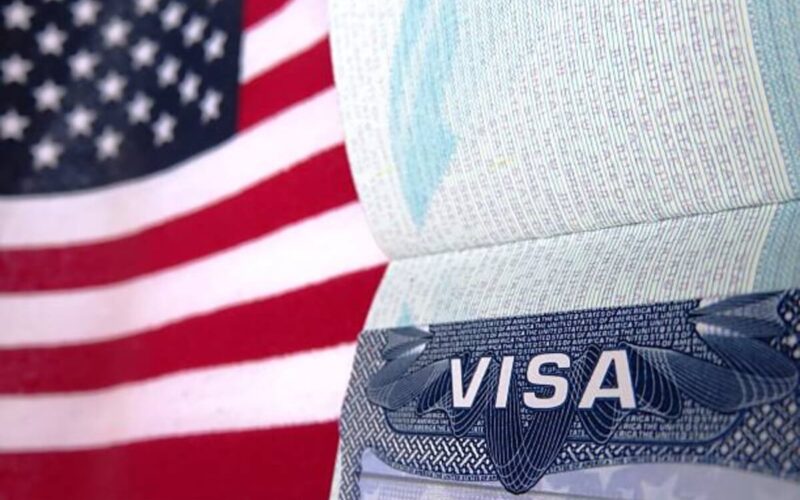The United States offers exceptional career development opportunities, financial stability, and a higher quality of life. International professionals looking for high-paying jobs in the U.S. must understand and navigate the visa sponsorship process.
Advertisement
A comprehensive guide to visa sponsorship requirements, high-paying roles, eligibility criteria, types of U.S. visas, and tips on finding sponsorship can be found in this resource.
What Is U.S. Visa Sponsorship?
An employer sponsors a foreign national’s visa application so that the foreign national can work legally in the U.S. An employer sponsors a foreign national’s visa application.
Advertisement
Generally, foreign nationals are not allowed to work in the United States without an employer’s sponsorship, which is a prerequisite for most work visas.
Getting a high-paying job in fields such as technology, finance, healthcare, or engineering requires understanding this sponsorship process.
Employer’s Role in Sponsorship
It is crucial that employers play a role in visa sponsorship. There are typically a number of requirements that employers must meet when they sponsor:
-
Job Offer: To ensure compliance with U.S. labor standards, including competitive wages and compensation, it is the employer’s responsibility to provide a job offer that meets these standards.
-
Filing Visa Petitions: Obtaining an H-1B visa requires employers to submit proper petitions (such as Form I-129 for the US Immigration and Citizenship Services).
-
Covering Sponsorship Costs: Most employers cover sponsorship-related expenses, such as filing fees, legal fees, and administrative costs.
-
Compliance with U.S. Labor Laws:. Employers must ensure that all requirements regarding wages and working conditions are met under U.S. labor laws.
Worker’s Responsibilities
The following responsibilities must also be met by employees to ensure a successful visa sponsorship:
-
Qualification Requirements: If you are applying for a job, make sure you have the required education, certification, and experience.
-
Document Accuracy: Verify identity and qualifications for visa applications with accurate, complete documentation.
-
Compliance with Visa Terms: As soon as you arrive in the U.S., you need to maintain a valid status by working only for the employer who sponsored you.
Benefits of High-Paying Job Opportunities in the U.S. ($100K+ Salaries)
The benefits of a high-paying U.S. job go beyond income alone. Besides providing financial security, they also improve quality of life and provide opportunities for professional advancement. In the U.S., a job earning $100K or more can be beneficial in the following ways:
Financial Security and Growth
-
Debt Reduction:. The ability to repay debt faster is one benefit of high-paying jobs that can help reduce financial stress. When you earn a six-figure salary, you can repay obligations like student loans, mortgages, and credit card balances sooner, increasing your credit and financial security.
-
Investments and Savings: Professionals with higher disposable incomes can grow their wealth through real estate investments, retirement accounts, and stock portfolios. It is imperative to have a solid investment portfolio if you want to accumulate wealth over the long run.
-
Emergency Fund: As a result of their high salaries, workers can establish and maintain an emergency fund. Medical emergencies or job transitions can be covered with an emergency fund for financial resilience.
Quality of Life Enhancements
-
Housing Options: The higher the earnings of professionals, the better the housing they can afford, whether they buy a home or rent in a neighborhood with excellent amenities. Having a better living environment can have a significant impact on a person’s well-being and quality of life.
-
Healthcare Access: The health benefits offered by many high-paying jobs are comprehensive, including coverage for medical care, dental care, and vision care. Health outcomes are improved and out-of-pocket expenses are minimized when individuals have access to quality healthcare services.
-
Educational Opportunities: When an individual has a high-paying job, he or she can spend money on education for themselves or their families, including private schools, universities, or advanced degrees. By investing in education, you will enhance your career prospects and open doors to new opportunities.
Professional and Personal Development
-
Continuous Learning: It is common for professionals in high-paying positions to possess complex skills and to continue their education, allowing them to grow within their fields by taking on challenging tasks, receiving training, and developing their skills.
-
Networking Opportunities: The ability to connect with industry networks is one of the benefits of being in prominent positions, which can facilitate career advancement and lead to jobs in related fields. Connecting with peers, mentors, and leaders can be a powerful tool for professional development.
-
Leadership Roles:. A high-paying position often comes with a lot of power and responsibility. These roles can provide valuable leadership experience, which can be useful in the future, as the organization grows.
Broader Economic Impact
-
Boosting Consumer Spending: By spending on goods, services, and investments, high-income earners contribute to the economy, stimulating sectors such as retail, hospitality, and real estate.
-
Tax Revenue Contributions: The importance of individuals in high-paying positions contributing to tax revenue, which supports public services such as education, infrastructure, and healthcare, cannot be overstated.
-
Job Creation and Local Support: High-earning individuals invest in new ventures and small businesses to support local economies as well as spending on services. Creating jobs and enhancing economic vitality are the results.
Eligibility Criteria for U.S. Visa Sponsorship
Visa sponsorship is dependent on the type of visa an applicant needs to apply for. There are, however, a number of general criteria that must be met both by the employer and the employee:
-
Job Offer: If you have a qualifying job offer from a U.S.-based company, your employer can sponsor your work visa.
-
Educational and skill requirements: It may be required for your H-1B visa application to have an advanced degree in a specialized field or to demonstrate exceptional ability, while for your O-1 visa application, you may need to demonstrate exceptional ability.
-
Non-U.S. Citizenship: Permanent residents and noncitizens in the United States are generally not allowed to obtain work visas.
-
Legal and health requirements: Visa applications may be subject to background checks, medical exams, and other legal requirements.
Types of U.S. Work Visas Sponsored by Employers
There are various types of visas available for U.S. work, each catering to a specific qualification or profession. Among the most commonly sponsored visas are:
H-1B Visa (Specialty Occupations)
-
Eligibility: In some fields (e.g., IT, engineering, medicine), a bachelor’s degree or higher is required (e.g., IT, engineering, medicine).
-
Duration: An initial grant of three years can be renewed for an additional three years.
-
Cap: In the first fiscal year of the program, a maximum of 85,000 visas will be granted, of which 20,000 will be reserved for U.S. graduate students.
L-1 Visa (Intra-Company Transfers)
-
Eligibility: Employees of multinational companies who transfer to U.S. offices are eligible for the program.
-
Duration: Executives/managers can apply for the L-1A (up to seven years), and specialized knowledge applicants can apply for the L-1B (up to five years).
-
Requirements:. A minimum of one year of experience working for the company abroad is required in the last three years.
EB-2 and EB-3 Visas (Employment-Based Immigrant Visas)
-
EB-2: For individuals with advanced degrees or exceptional ability.
-
EB-3: For professionals, skilled workers, and other workers meeting U.S. labor certification standards.
-
Benefit:. Provides holders with the opportunity to eventually apply for permanent residency (green cards) in the U.S.
O-1 Visa (Extraordinary Ability)
-
Eligibility: It is necessary for applicants to demonstrate extraordinary abilities in the arts, sciences, education, business, or athletics.
-
Duration: The validity period is three years, with the possibility of an extension.
-
Application: In order to demonstrate sustained acclaim, an award or recognition in the media is typically required.
TN Visa (NAFTA Professionals)
-
Eligibility: Applicants must be Canadian or Mexican professionals working in certain fields (e.g., engineering, accounting, research).
-
Duration: The license is granted for three years and can be renewed indefinitely.
-
Requirements: The following degrees and qualifications are listed in the United States-Mexico-Canada Agreement (USMCA).
E-2 Visa (Treaty Investor Visa)
-
Eligibility: Designed for foreign investors who have a U.S. trade treaty with their country and want to direct and develop businesses in the United States.
-
Investment Requirement: This requires a significant investment in an American company.
-
Duration: This investment will last for up to two years, with the option of renewing indefinitely.
Step-by-Step Guide to Applying for a U.S. Work Visa
Navigating the U.S. work visa application process can be challenging. The following steps will simplify the process:
Step 1: Secure a Job Offer
-
You should find an employer who will sponsor your visa in the U.S. Research companies that sponsor foreign talent in your field to find out if they sponsor foreigners.
Step 2: Employer Files a Petition
-
Employers must submit a petition to USCIS (Form I-129 for H-1B visas) in order to obtain an H-1B visa. An application for a visa can only be processed after the petition has been approved.
Step 3: Complete the DS-160 Visa Application Form
-
In order to apply for a nonimmigrant visa, the standard online application, Form DS-160, must be filled out once the petition has been approved.
Step 4: Pay the Visa Application Fee
-
It is necessary to pay your application fees and keep the receipt in order to schedule an interview for your visa.
Step 5: Schedule and Attend the Visa Interview
-
An interview is usually conducted at the U.S. embassy or consulate in your country of residence. Preparation is the key to answering questions about your job, qualifications, and intentions.
Step 6: Submit Required Documentation
-
You will need a passport, a confirmation of your application, the fee receipt, and a letter of employment offer before you can apply.
Step 7: Attend the Interview
-
If you are asked a question, make sure you have a clear response prepared. Honesty and thorough preparation make you more likely to succeed.
Step 8: Await Visa Processing
-
If possible, apply early for visas as processing times vary. It is important to be prepared for potential delays during peak times.
Step 9: Prepare for Your Move to the U.S.
-
Upon approval of your application, arrange for travel, accommodations, and any other details associated with your transition to the United States.
Key Documents Required for U.S. Visa Sponsorship
Documents required for visa applications include:
-
Valid passport: There must be a minimum six-month validity period on a passport after the intended stay.
-
DS-160 Application Form Confirmation: Proof of completed online visa application.
-
Visa Application Fee Receipt
-
Employment Offer Letter: Outlining job role, salary, and start date.
-
Educational and Professional Certificates: Degrees, diplomas, and relevant certifications.
-
Resume/CV:. Describe your work history and skills in a comprehensive document.
-
Proof of Financial Stability: Initially, you will have to submit bank statements or financial documents showing that you are able to support yourself.
-
Medical Examination Results (if required)
-
Police Clearance: Depending on the visa type, you may have to prove that you have no criminal background.
Top Strategies to Find U.S. Visa Sponsorship Opportunities
The following strategies are effective for obtaining a visa-sponsored job:
-
Research Visa-Sponsoring Companies: International employees are commonly hired by employers in sectors such as technology, finance, and healthcare.
-
Leverage Job Portals: You can find visa-sponsored jobs using filters like those offered by LinkedIn, Indeed, and Glassdoor.
-
Attend Job Fairs and Networking Events: Attending industry-specific job fairs can help you connect with employers who are willing to sponsor your visa.
-
Utilize Recruitment Agencies:. International candidates can be connected with U.S. companies through specialized agencies.
-
Connect with Alumni Networks: Former classmates and graduates who live and work in the U.S. contain a wealth of information.
-
Approach Companies Directly:. Feel free to reach out directly to companies, especially if you have skills that are in demand.
Top Companies Offering Visa Sponsorship for Foreign Talent
There is a high level of respect for sponsorship programs sponsored by certain U.S. companies. These are some of the companies that hire international talent frequently:
Technology
-
Google: The company regularly hires software engineers, data scientists, and artificial intelligence specialists.
-
Amazon: This company hires professionals from across the country in tech, logistics, and management.
-
Microsoft: Maintains a regular visa program for software developers, researchers, and product managers.
Finance
-
Goldman Sachs: Asset management, investment banking, and finance careers are offered by the company.
-
J.P. Morgan: The company frequently hires financial analysts and investment specialists.
Consulting
-
Deloitte: Consultancy, technology, and financial services are among the sectors where the company sponsors visas.
-
PwC: In order to meet its ongoing needs, the company regularly hires international talent for advisory, audit, and consulting positions.
Automotive and Engineering
-
Tesla: Technology, engineering, and manufacturing are some of his specialties.
-
General Electric (GE): Numerous industries are served by the company, which sponsors engineering, project management, and technical positions.
Challenges and How to Overcome Them
The process of obtaining a visa sponsorship can be challenging. Here are a few common obstacles and how to overcome them:
-
Finding a Willing Employer: Many companies are reluctant to undertake sponsorship because it is a complex process.
Solution: Make investments in high-demand industries, such as tech and healthcare, as well as regions where competition is low. -
Meeting Visa Requirements: Every visa type has its own requirements, and fulfilling them can be challenging at times.
Solution: You may need to obtain additional certifications or skills in order to comply with visa requirements. Research visa types in advance. -
Lengthy Processing Times: Depending on the country, visa processing times can vary.
Solution: In case premium processing options are available, apply early. -
Financial Costs:. In addition to application fees, legal fees, and travel expenses, there are other expenses involved.
Financial planning and finding employers who will cover the costs are the solutions.
Frequently Asked Questions
-
How long does visa sponsorship take?
Depending on the type of visa and USCIS’s workload, the processing time for a visa can range from a few months to more than a year. -
Can I switch employers after my visa is approved?
There are some visas that allow employer transfers, such as the H-1B visa, however the new employer will need to file a new petition. -
Can a friend sponsor me to the U.S.?
Work visa sponsorship is only possible through employers, but friends can provide referrals and networking assistance. -
Can I bring my family on a sponsored visa?
As part of a work visa, dependents, such as spouses and children, are allowed to live in the United States as well.
Conclusion
You can obtain a $100K+ U.S. visa-sponsored job with careful preparation, effective job-search strategies, and a thorough understanding of the visa process.
Having a high-paying job gives you the opportunity to secure your financial future, advance in your career, and enhance your quality of life. By approaching things properly, you can achieve your American dream in no time at all.






